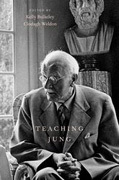
This book offers a collection of original articles presenting several different approaches to Jung's psychology in relation to religion, theology, and contemporary culture. The contributors describe their teaching of Jung in different academic contexts, with special attention to the pedagogical and theoretical challenges that arise in the classroom. Swiss psychologist Carl Jung (1875-1961) has made a major, though still contested, impact on the field of religious studies. Alternately revered and reviled, the subject of adoring memoirs andscathing exposes, Jung and his ideas have had at least as much influence on religious studies as have the psychoanalytic theories of his mentor, Sigmund Freud. Many of Jung's key psychological terms (archetypes, collective unconscious, individuation, projection, synchronicity, extroversion andintroversion) have become standard features of religious studies discourse, and his extensive commentaries on various religious traditions make it clear that Jung's psychology is, at one level, a significant contribution to the studyof human religiosity. His characterization of depth psychology asa fundamentally religious response to the secularizing power of modernity hasleft a lasting imprint on the relationship between religious studies and the psychological sciences. This book offers a collection of original articles presenting several different approaches to Jung's psychology in relation to religion, theology, and contemporary culture. The contributors describe their teaching of Jung in different academic contexts, with special attention to the pedagogical and theoreticalchallenges that arise in the classroom. Introduction: Teaching With and Against JungKelly Bulkeley and Clodagh WeldonPart I. Different Educational SettingsChapter One: The Challenge of Teaching Jung in the UniversityDavid TaceyChapter Two: Misprision:Pitfalls in Teaching Jung in a University Religious Studies DepartmentDavid L. MillerChapter Three: Teaching Jung in a Theological Seminary and a Graduate School of ReligionAnn Belford UlanovChapter Four: Teaching Jung in an Analytic Psychology InstituteMurray SteinPart II. The Interpretation of Religious Texts and ExperiencesChapter Five: Jung's Approach to MythRobert Alan SegalChapter Six: Jung's Engagement with Christian TheologyCharlene BurnsChapter Seven: God on the Couch:Teaching Jung's Answer to JobClodagh WeldonChapter Eight: Type-wise:Using Jung's Theory of Psychological Types in Teaching Religious Studies Undergraduate and Graduate StudentsChristopher RossPart III. Jung's Life, Work, and CriticsChapter Nine: Personal Secrets, Ethical QuestionsJohn HauleChapter Ten: Anima, Gender, FeminismSusan RowlandChapter Eleven: Jung as Nature MysticMeredith SabiniChapter Twelve: Teaching Jung in AsiaJeremy TaylorPart IV. Jungian Practices in the Classroom and BeyondChapter Thirteen: Teaching Jung and DreamsKelly BulkeleyChapter Fourteen: Jung and Winnicott in the Classroom:Holding, Mirroring, Potential Space and the SelfLaurel McCabeChapter Fifteen: Jung and the Numinous ClassroomBonnelle StricklingChapter Sixteen: Can There Be a Science of the Symbolic?John Beebe
- ISBN: 978-0-19-973542-6
- Editorial: Oxford University
- Encuadernacion: Cartoné
- Páginas: 304
- Fecha Publicación: 13/10/2011
- Nº Volúmenes: 1
- Idioma: Inglés
